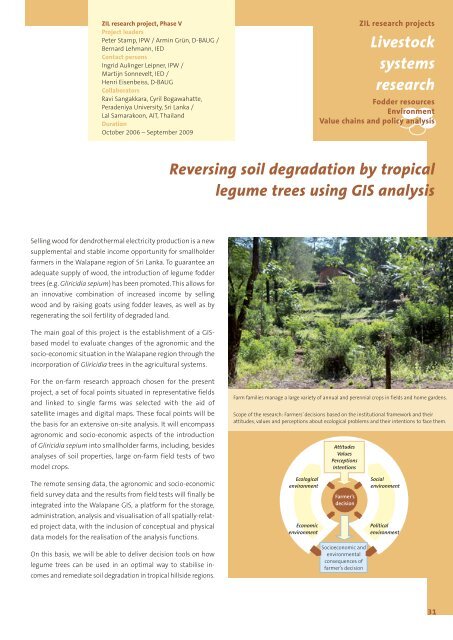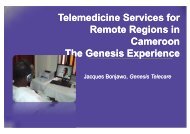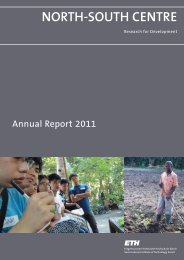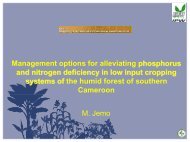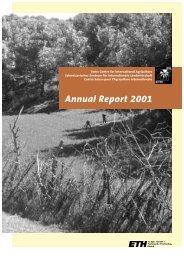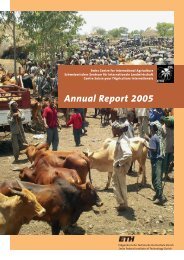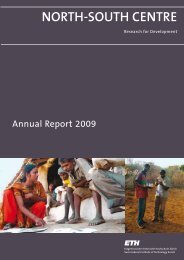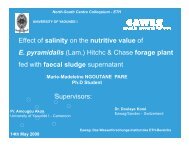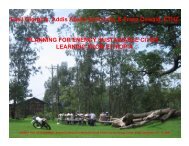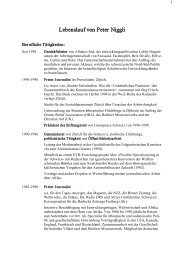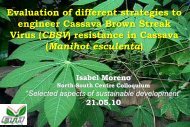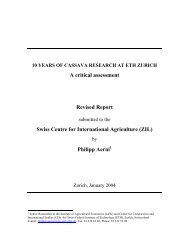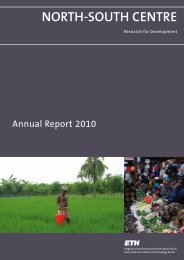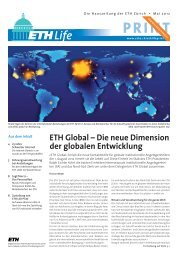Annual Report 2006/07 - ETH - North-South Centre North-South ...
Annual Report 2006/07 - ETH - North-South Centre North-South ...
Annual Report 2006/07 - ETH - North-South Centre North-South ...
Create successful ePaper yourself
Turn your PDF publications into a flip-book with our unique Google optimized e-Paper software.
ZIL research project, Phase VProject leadersPeter Stamp, IPW / Armin Grün, D-BAUG /Bernard Lehmann, IEDContact personsIngrid Aulinger Leipner, IPW /Martijn Sonnevelt, IED /Henri Eisenbeiss, D-BAUGCollaboratorsRavi Sangakkara, Cyril Bogawahatte,Peradeniya University, Sri Lanka /Lal Samarakoon, AIT, ThailandDurationOctober <strong>2006</strong> – September 2009ZIL research projectsLivestocksystemsresearchFodder resourcesEnvironmentValue chains and policy analysisReversing soil degradation by tropicallegume trees using GIS analysisSelling wood for dendrothermal electricity production is a newsupplemental and stable income opportunity for smallholderfarmers in the Walapane region of Sri Lanka. To guarantee anadequate supply of wood, the introduction of legume foddertrees (e.g. Gliricidia sepium) has been promoted. This allows foran innovative combination of increased income by sellingwood and by raising goats using fodder leaves, as well as byregenerating the soil fertility of degraded land.The main goal of this project is the establishment of a GISbasedmodel to evaluate changes of the agronomic and thesocio-economic situation in the Walapane region through theincorporation of Gliricidia trees in the agricultural systems.For the on-farm research approach chosen for the presentproject, a set of focal points situated in representative fieldsand linked to single farms was selected with the aid ofsatellite images and digital maps. These focal points will bethe basis for an extensive on-site analysis. It will encompassagronomic and socio-economic aspects of the introductionof Gliricidia sepium into smallholder farms, including, besidesanalyses of soil properties, large on-farm field tests of twomodel crops.Farm families manage a large variety of annual and perennial crops in fields and home gardens.Scope of the research: Farmers’ decisions based on the institutional framework and theirattitudes, values and perceptions about ecological problems and their intentions to face them.The remote sensing data, the agronomic and socio-economicfield survey data and the results from field tests will finally beintegrated into the Walapane GIS, a platform for the storage,administration, analysis and visualisation of all spatially-relatedproject data, with the inclusion of conceptual and physicaldata models for the realisation of the analysis functions.On this basis, we will be able to deliver decision tools on howlegume trees can be used in an optimal way to stabilise incomesand remediate soil degradation in tropical hillside regions.31


